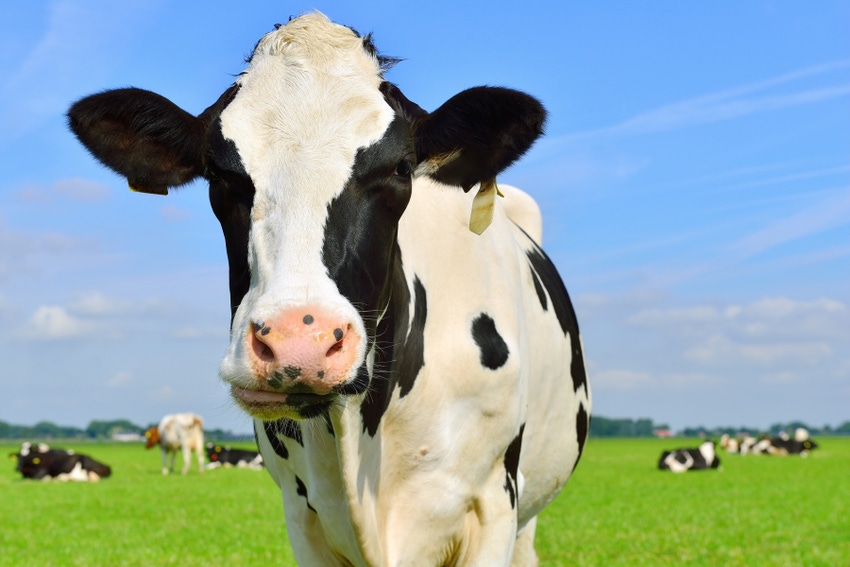Along with matching funding from industry, $1.47 million project at Cornell to study dairy cows' ability to withstand heat stress.
April 11, 2019

Heat-stressed dairy cows cost the American dairy industry an estimated $1.5 billion annually, and with temperatures expected to rise, the Foundation for Food & Agriculture Research (FFAR) awarded a $736,392 Seeding Solutions Grant to Cornell University to improve dairy cows’ ability to withstand extreme heat.
FFAR also reported that its grant is matched with funding from AB Vista, Adisseo, Balchem Corp., Berg + Schmidt, Elanco, Phibro Animal Health and Vetagro S.p.A. for a total $1.47 million investment.
The demand for dairy products and milk globally is expected to increase 57% by 2050, FFAR said, noting that rising temperatures will further compromise the U.S. dairy industry in meeting future demand. Dairy cows are unable to efficiently produce milk when their body temperatures rise above normal, a condition known as hyperthermia-induced heat stress. Heat-stressed dairy cows also have reduced fertility, are more likely to develop infectious and metabolic diseases and may succumb to premature death.
According to Dr. Joseph McFadden, Cornell assistant professor of cattle biology and principal investigator, “Climate change and extreme heat represent key barriers for the sustainable production of milk that meets consumer expectations for quality as well as the rising global demand for dairy foods. We must act now to develop innovative solutions that revolutionize how we feed heat-stressed cows to ensure optimum animal health and welfare while achieving gains in efficient milk production.”
Heat stress in cattle is linked to a condition commonly called leaky gut. Specifically, hyperthermia can lead to bacterial endotoxins leaking from the gut, which causes liver inflammation. In response, the cow’s body pulls resources from producing milk to preserve health, the announcement said.
Researchers will start by understanding the relationship between dairy cattle’s gut health, intestinal permeability, liver health, immunity and milk production. Working with the industry, McFadden’s team will determine whether heat-stressed dairy cows can recover if fed specific remedies, FFAR said. Ultimately, this project aims to identify nutrition-based solutions that improves dairy cows’ ability to adapt to extreme heat.
“Heat stress is an urgent animal health and welfare concern, and it also creates additional pressures for the nation’s dairy farmers,” FFAR executive director Sally Rockey said. “FFAR is optimistic that Cornell’s research can improve the health of dairy cows, increase efficient milk production and help American dairy farmers protect their livestock.”
FFAR’s Seeding Solutions Grant program is an open call for bold ideas that address a pressing food and agricultural issues in one of the foundation’s Challenge Areas. Cornell’s research furthers FFAR’s 2018 Protein Challenge Area, now the Advanced Animal Systems Challenge Area. The work in this area supports sustainable animal systems through innovative technologies, environmentally sound production practices and advancements in animal health and welfare, FFAR said.
This research project has the potential to not only meet FFAR’s goals but also develop solutions that can improve the American dairy industry.
McFadden’s team will further partner with industry collaborators to reduce the use of limited natural resources and drive down dairy production costs in support of a more sustainable and economically viable American dairy industry, FFAR announced.
According to FFAR, the consortium of allied industry partners that committed support demonstrates the urgent need for new strategies to improve gut and liver health in heat-stressed cows, and their involvement is essential to ensure the translation of discoveries into practical, on-farm dairy nutrition strategies.
FFAR said McFadden will work with each sponsor and the Cornell PRO-DAIRY program to disseminate knowledge in an annual editorial series called “Beat the Heat: Dairy Nutrition Strategies for Optimum Cow Health” that will be shared with thousands of American dairy farmers.
“The American dairy industry is a leading domestic and international supplier of dairy. This translational research program in collaboration with industry has the potential to revolutionize dairy cattle nutrition to ensure that our American dairy farmers will continue to produce a high-quality food. Global population growth and climate change are real challenges and we aim to develop real solutions,” McFadden said.
Source: FFAR, which is solely responsible for the information provided and is wholly owned by the source. Informa Business Media and all its subsidiaries are not responsible for any of the content contained in this information asset.
You May Also Like

.png?width=300&auto=webp&quality=80&disable=upscale)

